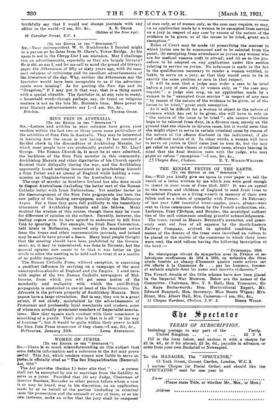WOMEN ON JURIES.
[To THE EDITOR or THE " SPECTATOR."] SIR,—There is so much misunderstanding on this subject that some definite information and a reference to the Act may prove useful. This Act, which renders women now liable to serve on Itades, is officially cited as "The Sex Disqualification (Removal) Lot, 1919."
The Aot provides (Section I.) inter alia that ". . . a person shall not be exempted by sex or marriage from the liability to serve as a juror. Provided that (b) any Judge, Chairman of Quarter Sessions, Recorder or other person before whom a case is or may be heard, may in hie discretion, on an application made by or on behalf of the parties (including in criminal cases the proeeoution and the accused) or any of them, or at his awn instance, make an order that the jury shall be composed of men only, or of women only, as the case may require, or may, on an application made by a woman to be exempted from service
on a jury in respect of any case by reason of the nature of the evidence to be given, or of the issues to be tried, grant such- exemption."
Rules of Court may be made (a) prescribing the manner in which juries are to be summoned and to be selected from the panel; (b) exempting from attendance as jurors any women who are for medical reasons unfit to attend; and (c) as to the pro- cedure to be adopted on any application under this section relating to service on juries. No reference is made in the Act to the qualification necessary to render a woman entitled, or liable, to serve on a jury, so that they would seem to be in exactly the same position as men in that respect.
It will be seen that a judge may order a case to be tried before a jury of men only, or women only, as " the case may require": a judge also may, on an application made by a woman to be " exempted from service " in respect of any case " by reason of the nature of the evidence to be given, or of the issues to be tried," grant such exemption.
As it will be difficult for a woman to object to the nature of evidence which has yet to be given, she will have to rely on " the nature of the issue to be tried ": she cannot therefore hope to be relieved from duty, in a divorce case, merely on the ground that she objects to divorce cases, but it would seem that she might object to serve in certain criminal cases by reason of the nature of the offence disclosed in the indictment, if she had sufficient notice of it. In other words, a woman will have to serve on juries in Civil cases just as men do, but she may get relief in certain classes of criminal cases, always bearing in mind that the final decision rests with the judge, who may grant or refuse " exemption."—I am, Sir, &o.,


































 Previous page
Previous page